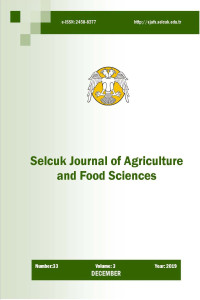The Effects of Addition to Different Levels of Mealworm (Tenebrio molitor) to Quail Diets on Performance and Carcass Traits
Öz
Performance and carcass traits of quails fed by diets containing mealworms were investigated. A total of 200 mixed-sex one-day-old quail chicks were used in the study. The basal diets were supplemented with 0, 2, 4 and 6 % mealworm (Tenebrio molitor). Four levels of dietary mealworm were arranged in a completely randomized design and the treatments were replicated five times with 10 birds. The chicks were randomly assigned to among 20 cage pens. Feed and water were supplied ad-libitum. In the first week of the study, all quails were fed with the control diet. During the next four weeks, the quails were fed with 4 experimental diets. There were significant differences in body weight gain and feed conversion ratio between the treatment groups (P<0.05; P<0.01). The body weight gain of quails fed by diet containing 6 % dietary mealworm was lower than the quails fed by the diets containing 2 % mealworm. Feed conversion ratio increased by feeding with 4 and 6 % dietary mealworm level when compared to the control and 2 % dietary mealworm level group (P<0.01). Feed intake, carcass weight and carcass yield did not differ among the dietary treatments. The study suggested that performance parameters could be lower when dietary level of mealworm meal higher than 2 %.
Anahtar Kelimeler
Ayrıntılar
| Birincil Dil | İngilizce |
|---|---|
| Konular | Hayvansal Üretim (Diğer) |
| Bölüm | Araştırma Makalesi |
| Yazarlar | |
| Yayımlanma Tarihi | 15 Aralık 2019 |
| Gönderilme Tarihi | 23 Ağustos 2019 |
| Yayımlandığı Sayı | Yıl 2019 Cilt: 33 Sayı: 3 |
Selcuk Journal of Agriculture and Food Sciences Creative Commons Atıf-GayriTicari 4.0 Uluslararası Lisansı (CC BY NC) ile lisanslanmıştır.


